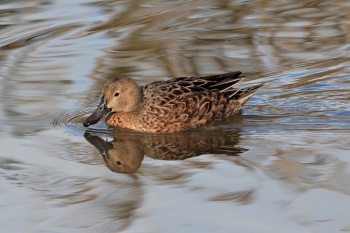
Photo by Fulmar
Upper Newport Bay, Newport Beach, Orange County, California, USA, February 2004
- Spatula cyanoptera
Identification
35–48 cm (13¾-19 in); a small dabbling duck
Adult Male
- Cinnamon-red head and body
- Brown back
- Red eye
- Dark bill
Adult Female
- Mottled brown body
- Pale brown head
- Brown eyes
- Grey bill
Similar Species
Female very similar to female Blue-winged Teal
Distribution
Western North and South America. They are migratory and most winter in Central and South America, generally not migrating as far as the Blue-winged Teal.
Occurs as vagrants in the Caribbean.
Taxonomy
Formerly placed in the genus Anas.
Subspecies

Photo by Stanley Jones
Los Pantanos de Villa Refuge, Chorrillos, Lima, Peru, August 2017
There are 5 subspecies1:
- S. c. septentrionalium: (Northern Cinnamon Teal)
- British Columbia to north-western Mexico; winters to north-western South America
- S. c. tropica: (Tropical Cinnamon Teal)
- Cauca and Magdalena valleys of Colombia
- S. c. borreroi: (Borrero's Cinnamon Teal); possibly extinct
- Eastern Andes of Colombia
- S. c. orinoma: Andean Cinnamon Teal
- S. c. cyanoptera: Argentine Cinnamon Teal
- Southern Peru and southern Brazil to Tierra del Fuego and Falkland Islands
Habitat
They use both fresh water and brackish marshes and ponds with plenty of emergent plants and vegetation around the edges, like cattails and bulrushes.
Behaviour
Breeding
Generally select new mates each year.
Diet
Dabbling ducks, the most important part of their diet is the seeds and roots of aquatic plants, but they also eat molluscs and aquatic insects.
References
- Clements, J. F., T. S. Schulenberg, M. J. Iliff, D. Roberson, T. A. Fredericks, B. L. Sullivan, and C. L. Wood. 2017. The eBird/Clements checklist of birds of the world: v2017, with updates to August 2017. Downloaded from http://www.birds.cornell.edu/clementschecklist/download/
- Handbook of the Birds of the World Alive (retrieved Dec 2017)
- BF Member observations
- Wikipedia
Recommended Citation
- BirdForum Opus contributors. (2024) Cinnamon Teal. In: BirdForum, the forum for wild birds and birding. Retrieved 24 April 2024 from https://www.birdforum.net/opus/Cinnamon_Teal





